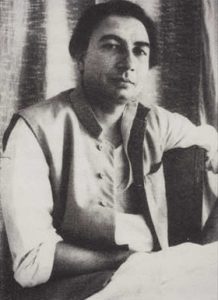 Sahir Ludhianvi
Sahir Ludhianvi
(Sāḥir Ludhiyānvī; ‘Abdul Ḥa’ī Faẓl Muḥammad)
1921 – 80
 Sahir Ludhianvi
Sahir LudhianviSahir Ludhianvi (Sāḥir Ludhiyānvī; 1921-80) was born Abdul Ḥai Fazl Muhammad (‘Abdul Ḥa’ī Faẓl Muḥammad) in Karimpura, Ludhiana, Punjab. A leading modern Urdu poet, he was perhaps the most successful and popular of the many Bollywood film lyricists. Many of his best-known poems—viz., “Cakle” (Brothels)* and “Tāj maḥal” (Taj Mahal)*—were written for specific Bollywood films. Some of them are lush, passionate love songs—e.g., “Intiz̤ār” (Waiting)*—others are replete with social and political content, especially regarding society’s mistreatment of women—notably, “‘Aurat ne janam diyā mardon̲ ko” (Woman Gave Birth to Men)*—which, some critics suggest, possibly stems from the harsh and bitter treatment his father inflicted upon his mother during protracted divorce proceedings and custody fight.
He did not earn a college degree for a number of reasons but worked instead on a number of literary journals, such as Adab-i latīf (Belles Lettres) and Saverā (Morning), through which he came into contact with the Progressive Movement. By 1942 he had made important contact with the Bombay film industry writing songs for highly popular films. His first collection of poems, Talk̲h̲iyān̲ (Bitterness), appeared in 1944 when he was twenty-three. It had been augmented several times and had gone through scores of editions, legal and pirated. In 1964 he published Gātā jāʼe banjārā (The Gypsy Passes by Singing), a volume of his film songs, and in 1971, Ā’o kih ko‘ī khvāb bunen (Come So We Might Build Some Dreams).
Many of his poems and film lyrics have been translated into English: Khwaja Ahmad Abbas, Shadows Speak: Parchaiyan (1958), Raffat Hassan, The Bitter Harvest: Selections from Sahir Ludhianvi’s Verse (1977), K. T. Mahmood, Kalam-i Saḥir Ludhiyanvi: A Collection of Ludhiavni’s Poetry with English Translation (2000), and Akshay Manwan, Sahir Ludhianvi: The People’s Poet (2013).
See Carlo Coppola, “Politics, Social Criticism and Indian Film Songs: The Case of Sahir Ludhianvi,” Journal of Popular Culture, 10:4 (1977) 897-902 and “Sahir Ludhianvi: The Progressive as Lyric Poet.” Urdu Poetry, 1935-1970: The Progressive Episode (2017) 504-35.
2. Ab koʻī gulshan nah ujṛe / Now Let No Garden Be Spoiled
3. Ajnabī muḥāfiẓ / Foreign Protectors
4. Aurat ne janam diyā mardon̲ ko / Woman Gave Birth to Men
8. Ek taṣvīr-i rang / A Picture of Color
11. Issi do rāhe par / At This Crossroad
13. Kabhī kabhī / Once in a While
14. Kal aur āj / Yesterday and Today
15. K̲h̲udkushī se pahle / Before Suicide
16. Lamhe-i g̲h̲anīmat / God-Sent Moment
19.Matāʻ-i g̲h̲air / Stranger’s Wealth
20. Mere ʻahd ke hasīnon̲ / Beautiful People of My Age
21. Nayā safar hai purāne cirāg̲h̲ gul kar do / It’s a New Journey, Put out the Old Lamps
22. Nūr jahān̲ ke mazār par / At Nur Jahan’s Tomb
26. Shikast / Defeat
27. Shikast-i zindān̲ / Destroying the Prison
Coppola, Carlo. “Politics, Social Criticism and Indian Film Songs: The Case of Sahir Ludhianvi.” Journal of Popular Culture. 10:4 (1977), 897-902.
Rpt in Cinema Vision India. The Golden Age of Hindi Film Music Issue. 2:2. 1983. 79-81.
__________. “Sahir Ludhianvi: The Progressive as Lyric Poet.” Urdu Poetry, 1935-1970: The Progressive Episode. Karachi: Oxford University Press. 2017. 504-535.
__________. “Meeting Krishan Chander, Then Dinner and Bar-Hopping with Sahir Ludhianvi, Rajinder Singh Bedi, and Jan Nisar Akhtar.” Speaking of/with/about/to South Asian Writers: Interviews and Essays. Bombay: Monday, 29 January 1968. 6:15 p.m. Forthcoming.

